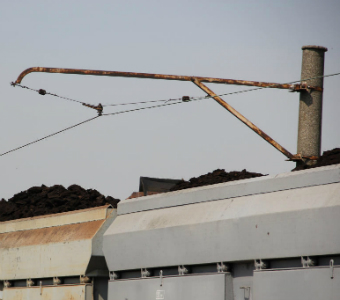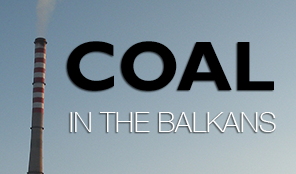The signing of an agreement in November 2014 to export 1.2 million tons of coal from Romania to Serbia was seen as one of those win-win contracts for both countries. Half a year later, the deal, tarnished by corruption allegations and a dodgy tender process (Bankwatch reported), seems to be going from bad to worse.
Last week, reports in Romanian national media revealed that the contract between the Romanian state-owned Oltenia Energy Complex (OEC) and a consortium of three Serbian and Romanian firms was suspended and is likely to be cancelled soon, because the Serbian part has failed to pay for the imported coal. In line with the contract, Oltenia Energy Complex has so far delivered more than half of the 1.2 million tons of lignite to Coal BVA, the Romanian company that is part of the consortium. Yet, as Romanian media reported last week, OEC cashed in only 500 000 euros until now. With a price of EUR 13.5/ton [1], this means a little over six percent recovery. Representatives of OEC stated that the Serbian company Virom groupa doesn’t even return their calls, let alone pay for the delivered coal. (No comment was available from BVA Coal so far.)
The contract was designed to be profitable for the 3 companies making up the consortium, hardly for OEC, which is selling the lignite at a lower price than that of production.[2] Still, in November OEC’s manager, was reported saying that he “would sign another contract unconditionally at a price of EUR 13/ton, if he had the opportunity to export coal to Serbia for another 20 years.” He also claimed in February that this was the best contract ever signed by his company, although now it only seems to add to OEC’s unrecovered claims which stood at EUR 220 million in 2014.
Back in November, OEC withdrew its bid for supplying coal to Serbia in the last minute, referring to a EUR 1,5/ton custom tax too high to pay and inability to ensure the transport of coal across the border into Serbia. Instead, it agreed to supply the 1.2 tons of lignite to an apartment company set-up only one month before the contract was signed, part of the controversial consortium involving oil and customs mafia companies in Serbia.
The contract is currently being investigated by the internal control body within the Ministry of Energy and the findings may throw the OEC into yet another corruption scandal, adding to the ones involving former Minster of Large Infrastructure Projects Dan Sova and current OEC general manager, Laurentiu Ciurel.
While this all sounds like a drama whose victims don’t deserve our sympathy (from the energy mammoth to suspicious trading companies) the real cost of coal goes way beyond these unpaid bills of a dodgy deal.
The lignite open-pit mines in the Oltenia region are planned to expand over an area of 700 hectares of forests and require the expropriation of approximately 70 households. In the last 25 years, in addition to forests, expanding lignite pits wiped out at least three villages and many others suffer from the proximity to the pits.
Because of legislative loopholes, Oltenia Energy Complex is slicing the total area it needs to destroy into fragments of up to one hectare, enough for a few weeks of mining operations. Thus it avoids going through a procedure to identify the social and environmental impact of mining expansions and the measures to reduce it. As a glimmer of hope, 211 of the 700 hectares have been saved from deforestation after positive court decisions in petitions filed by Bankwatch Romania and Greenpeace Romania.
How does all this make coal “a cheap, clean and reliable source of energy” that is worth putting our money in as most governments in the region are portraying it? I am hoping I will not have to repeat this point much longer.
Notes:
1. Representatives of Oltenia Energy Complex are quoted with different prices for the coal in the same report. While OEC’s general manager speaks of EUR 13/ton, its mining operations director mentions EUR 13.5/ton.
2. According to the same local media reports, financial reports of OEC showed a cost of production of RON 65/ton of coal at the time the contract was signed. The contract however used an anticipated price of production for 2015 of RON 58/ton. In addition, the coal produced by OEC apparently comes at a granulation too big to serve the Serbian power plants, which required OEC to purchase extra equipment to make the pieces smaller.
Never miss an update
We expose the risks of international public finance and bring critical updates from the ground – straight to your inbox.
Theme: Energy & climate | Social & economic impacts
Location: Romania | Serbia
Tags: Oltenia Energy Complex | coal | corruption | lignite | mining



